- Home
- Franklin W. Dixon
The Tower Treasure Page 6
The Tower Treasure Read online
Page 6
Mr. Hardy tossed the wig, coat, and hat into a bag that was standing open near his desk. The detective was accustomed to being called away suddenly on strange errands, and he was always prepared to leave at a moment’s notice.
“Not much use starting now,” he said, glancing at his watch. “But I’ll go to the city first thing in the morning. In the meantime, you boys keep your eyes and ears open for more clues. The case isn’t over yet by any means.”
Mr. Hardy picked up some papers on his desk, as a hint that the interview was over, and the boys left the study. They were in a state of high excitement when they went to bed that night and could not get to sleep.
“That thief must be pretty smart,” murmured Joe, after they had talked long into the night.
“The smarter crooks are, the harder they fall,” Frank replied. “If this fellow has any kind of a record, it won’t take long for Dad to run him down. I’ve heard Dad say that there is no such thing as a clever crook. If he was really clever, he wouldn’t be a crook at all.”
“Yes, I guess there’s something in that, too. But it shows that we’re not up against any amateur. This fellow is a slippery customer.”
“He’ll have to be mighty slippery from now on. Once Dad has a few clues to work on he never lets up till he gets his man.”
“And don’t forget us,” said Joe, yawning. With that the boys fell asleep.
When they went down to breakfast the following morning Frank and Joe learned that their father had left for New York on an early-morning plane. Their mother remarked, “I’ll be so relieved when he gets back. So often these missions turn out to be dangerous.”
She went on to say that her husband had promised to phone her if he wasn’t going to be back by suppertime. Suddenly she added with a tantalizing smile, “Your father said he might have a surprise for you if he remains in New York.”
Mrs. Hardy refused to divulge another word. The boys went to school, but all through the morning could scarcely keep their minds on studies. They kept wondering how Fenton Hardy was faring on his quest in New York and what the surprise was.
Slim Robinson was at school that day, but after classes he confided to the Hardys that he was leaving for good.
“It’s no use,” he said. “Dad can’t keep me in school any longer and it’s up to me to pitch in and help the family. I’m to start work tomorrow at a supermarket.”
“And you wanted to go to college!” exclaimed Frank. “It’s a shame!”
“Can’t be helped,” replied Perry with a grimace. “I consider myself lucky to have stayed in school this long. I’ll have to give up all those college plans and settle down in the business world. There’s one good thing about it—I’ll have a chance to learn supermarket work from the ground up. I’m starting in the receiving department.” He smiled. “Perhaps in about fifty years I’ll be head of the firm!”
“You’ll make good at whatever you tackle,” Joe assured him. “But I’m sorry you won’t be able to go through college as you planned. Don’t give up hope yet, Slim. One never knows what may happen. Perhaps the thief who did rob Tower Mansion will be found.”
Frank and Joe wanted to tell Slim about the clues they had discovered the previous day, but the same thought came into their minds—that it would be unfair to raise any false hopes. So they said good-by and wished him good luck. Perry tried hard to be cheerful, but his smile was very faint as he turned away from them and walked down the street.
“I sure feel sorry for him,” said Frank, as he and Joe started for home. “He was such a hard worker in school and counted so much on going to college.”
“We’ve just got to clear up the Tower robbery, that’s all there is to it!” declared his brother.
As they neared the Hardy home, the boys’ steps quickened. Would they find that their father had returned with the information on the identity of the thief? Or was he still in New York? And were they about to share another of his secrets?
CHAPTER X
A Sleuthing Trip
FRANK and Joe’s first stop was the Hardy garage. Looking in, they saw that only Mrs. Hardy’s car was there. Their father had taken his sedan to the airport and not brought it back.
“Dad’s not home!” Joe cried excitedly. “Now we’ll hear what the surprise is.” Dashing into the kitchen, he called, “Mother!”
“I’m upstairs, dear,” Mrs. Hardy called back.
The boys rushed up the front stairway two steps at a time. Their mother met them at the door of their bedroom. Smiling broadly, she pointed to a packed suitcase on Frank’s bed. The boys looked puzzled.
Next, from her dress pocket, Mrs. Hardy brought out two plane tickets and some dollar bills. She handed a ticket and half the money to each of her sons, saying, “Your father wants you to meet him in New York to help him on the case.”
Frank and Joe were speechless for a moment, then they grabbed their mother in a bear hug. “This is super!” Joe exclaimed. “What a surprise!”
Frank looked affectionately at his mother. “You sure were busy today—getting our plane tickets and money. I wish you were going too.”
Mrs. Hardy laughed. “When I go to New York for a week end I want to have fun with you boys, not trot around to police stations and thieves’ hide-outs!” she teased. “I’ll go some other time. Well, let’s hurry downstairs. There’s a snack ready for you. Then I’ll drive my detective sons to the airport.”
In less than two hours the boys were on the plane to New York City. Upon landing there, they were met by Mr. Hardy. He took them to his hotel, where he had engaged an adjoining room for them. It was not until the doors were closed that he brought up the subject of the mystery.
“The case has taken an interesting turn, and may involve considerable research. That’s why I thought you might help me.”
“Tell us what has happened so far,” Frank requested eagerly.
Mr. Hardy said that immediately upon arriving in the city he had gone to the office of the company which had manufactured the red wig. After sending in his card to the manager he had been admitted readily.
“That’s because the name of Fenton Hardy is known from the Atlantic to the Pacific!” Joe interjected proudly.
The detective gave his son a wink and went on with the story. “‘Some of our customers in trouble, Mr. Hardy?’ the manager asked me when I laid the red wig on his desk.
“‘Not yet,’ I said. ‘But one of them may be if I can trace the purchaser of this wig.’
“The manager picked it up. He inspected it carefully and frowned. ‘We sell mainly to an exclusive theatrical trade. I hope none of the actors has done anything wrong.’
“‘Can you tell me who bought this one?’ I asked.
“‘We make wigs only to order,’ the manager said. He pressed a button at the side of his desk. A boy came and departed with a written message. ‘It may be difficult. This wig is not a new one. In fact, I would say it was fashioned about two years ago.’
“‘A long time. But still—’ I encouraged him,” the detective went on. “In a few minutes a bespectacled elderly man shuffled into the office in response to the manager’s summons.
“‘Kauffman, here,’ the manager said, ‘is our expert. What he doesn’t know about wigs isn’t worth knowing.’ Then, turning to the old man, he handed him the red wig. ‘Remember it, Kauffman?’
“The old man looked at it doubtfully. Then he gazed at the ceiling. ‘Red wig—red wig—’ he muttered.
“‘About two years old, isn’t it?’ the manager prompted.
“‘Not quite. Year’n a half, I’d say. Looks like a comedy-character type. Wait’ll I think. There ain’t been so many of our customers playin’ that kind of a part inside a year and a half. Let’s see. Let’s see.’ The old man paced up and down the office, muttering names under his breath. Suddenly he stopped, snapping his fingers.
“‘I have it,’ he said. ‘It must have been Morley who bought that wig. That’s who it was! Harold Morley. He’s pla
yin’ in Shakespearean repertoire with Hamlin’s company. Very fussy about his wigs. Has to have ’em just so. I remember he bought this one, because he came in here about a month ago and ordered another like it.’
“‘Why would he do that?’ I asked him.
“Kauffman shrugged his shoulders. ‘Ain’t none of my business. Lots of actors keep a double set of wigs. Morley’s playin’ down at the Crescent Theater right now. Call him up.’
“‘I’ll go and see him,’ I told the men. And that’s just what we’ll do, Frank and Joe, after a bite of supper.”
“You don’t think this actor is the thief, do you?” Frank asked in amazement. “How could he have gone back and forth to Bayport so quickly? And isn’t he playing here in town every night?”
Mr. Hardy admitted that he too was puzzled. He was certain Morley was not the man who had worn the wig on the day the jalopy was stolen, for the Shakespearean company had been playing a three weeks’ run in New York. It was improbable, in any case, that the actor was a thief.
The three Hardys arrived at Mr. Morley’s dressing room half an hour before curtain time. Mr. Hardy presented his card to a suspicious doorman at the Crescent, but he and his sons were finally admitted backstage and shown down a brilliantly lighted corridor to the dressing room of Harold Morley. It was a snug place, with pictures on the walls, a potted plant in the window overlooking the alleyway, and a rug on the floor.
Seated before a mirror with electric lights at either side was a stout little man, almost totally bald. He was diligently rubbing creamy stage make-up on his face. He did not turn around, but eyed his visitors in the mirror, casually telling them to sit down. Mr. Hardy took the only chair. The boys squatted on the floor.
“Often heard of you, Mr. Hardy,” the actor said in a surprisingly deep voice that had a comical effect in contrast to his diminutive appearance. “Glad to meet you. What kind of call is this? Social —or professional?”
“Professional.”
Morley continued rubbing the make-up on his jowls. “Out with it,” he said briefly.
“Ever see this wig before?” Mr. Hardy asked him, laying the hair piece on the make-up table.
Morley turned from the mirror, and an expression of delight crossed his plump countenance. “Well, I’ll say I’ve seen it before!” he declared. “Old Kauffman—the best wigmaker in the country —made this for me about a year and a half ago. Where did you get it? I sure didn’t think I’d ever see this red wig again.”
“Why?”
“Stolen from me. Some low-down sneak got in here and cleaned out my dressing room one night during the performance. Nerviest thing I ever heard of. Came right in here while I was doing my stuff out front, grabbed my watch and money and a diamond ring I had lying by the mirror, took this wig and a couple of others that were around, and beat it. Nobody saw him come or go. Must have got in by that window.”
Morley talked in short, rapid sentences, and there was no mistaking his sincerity.
“All the wigs were red,” he stated. “I didn’t worry so much about the other wigs, because they were for old plays, but this one was being used right along. Kauffman made it specially for me. I had to get him to make another. But say—where did you find it?”
“Oh, my sons located it during some detective work we’re on. The crook left this behind. I was trying to trace him by it.”
Morley did not inquire further. “That’s all the help I can give you,” he said. “The police never did learn who cleaned out my dressing room.”
“Too bad. Well, I’ll probably get him some other way. Give me a list and description of the articles he took from you. Probably I can trace him through that.”
“Glad to,” said Morley. He reached into a drawer and drew out a sheet of paper which he handed to the detective. “That’s the same list I gave the police when I reported the robbery. Number of the watch, and everything. I didn’t bother to mention the wigs. Figured they wouldn’t be in any condition to wear if I did get them back.”
Mr. Hardy folded the list and put it in his pocket. Morley glanced at his watch, lying face up beside the mirror, and gave an exclamation. “Suffering Sebastopol! Curtain in five minutes and I’m not half made up yet. Excuse me, folks, but I’ve got to get on my horse. In this business ‘I’ll be ready in a minute’ doesn’t go.”
He seized a stick of grease paint and feverishly resumed the task of altering his appearance to that of the character he was portraying at that evening’s performance. Mr. Hardy and his sons left. They made their way out to the street.
“Not much luck there,” Frank commented.
“Except through Mr. Morley’s stolen jewelry,” his father reminded him. “If that’s located in a pawnshop, it may lead to the thief. Well, boys, would you like to go into the theater via the front entrance and see the show?”
“Yes, Dad,” the brothers replied, and Joe added, “Tomorrow we’ll try to find out the name and address of the thief through his coat and hat?”
“Right,” the detective said.
The Hardys enjoyed the performance of The Merchant of Venice with Mr. Morley as Launcelot Gobbo, and laughed hilariously at his comedy and gestures.
The next morning the detective and his sons visited the store from which the thief’s jacket and hat had been purchased. They were told that the styles were three years out of date and there was no way to tell who had bought them.
“The articles,” the head of the men’s suit department suggested, “may have been picked up more recently at a secondhand clothing store.” The Hardys thanked him and left.
“All this trip for nothing.” Joe gave a sigh.
His father laid a hand on the boy’s shoulder. “A good detective,” he said, “never sighs with discouragement nor becomes impatient. It took years of persistence to solve some famous cases.”
He suggested that their next effort be devoted to doing some research in the city’s police files. Since Mr. Hardy had formerly been a member of the New York City detective force, he was permitted to search the records at any time.
Frank and Joe accompanied him to headquarters and the work began. First came a run-down on any known New York criminals who used disguises. Of these men, the Hardys took the reports on the ones who were thin and of medium height.
Next came a check by telephone on the whereabouts of these people. All could be accounted for as working some distance from Bayport at the time of the thefts, with one exception.
“I’ll bet he’s our man!” Frank exclaimed. “But where is he now?”
CHAPTER XI
Anxious Waiting
THE suspect, the Hardys learned, was out of prison on parole. His name was John Jackley, but he was known as Red Jackley because when caught before going to prison he had been wearing a red wig.
“He lives right here in New York, and maybe he’s back home by this time,” Joe spoke up. “Let’s go see him.”
“Just a minute,” Mr. Hardy said, holding up his hand. “I don’t like to leave Mother alone so long. Besides, in this type of sleuthing three detectives together are too noticeable to a crook. This Jackley may or may not be our man. But if he is, he’s probably dangerous. I want you boys to take the evening plane home. I’ll phone the house the minute the thief is in custody.”
“All right, Dad,” his sons chorused, though secretly disappointed that they had to leave.
When they reached home, Frank and Joe learned that their mother had been working on the case from a completely different angle. Hers was the humanitarian side.
“I went to call on the Robinsons to try to bolster their spirits,” she said. “I told them about your trip to New York and that seemed to cheer them a lot. Monday I’m going to bake a ham and a cake for you to take to them. Mrs. Robinson isn’t well and can do little in the kitchen.”
“That’s swell of you!” Frank said admiringly. “I’ll go.”
Joe told them he had a tennis match to play. “I’ll do the next errand,” he promised.
Monday, during a change of classes, Frank met Callie Shaw in the corridor. “Hi!” she said. “What great problem is on Detective Hardy’s mind? You look as if you’d lost your best criminal!”
Frank grimaced. “Maybe I have,” he said.
He told Callie that he had phoned home at noon confidently expecting to hear that his father had reported the arrest of the real thief of the Applegate money and the exoneration of Mr. Robinson. “But there was no word, Callie, and I’m worried Dad may be in danger.”
“I don’t blame you,” she said. “What do you think has happened?”
“Well, you never can tell when you’re dealing with criminals.”
“Now, Frank, you’re not trying to tell me your father would let himself get trapped?” Callie said.
“No, I don’t think he would, Callie. Maybe Dad hasn’t returned because he still hasn’t found the man he was looking for.”
“Well, I certainly hope that thief is caught,” said Callie. “But, Frank, nobody really believes Mr. Robinson did it!”
“Nobody but Hurd Applegate and the men who employ people. Until they find the man who did take the stuff, Mr. Robinson is out of a job.”
“I’m going over to see the Robinsons soon. Where are they living?”
Frank gave Callie the address. Her eyes widened. “Why, that’s in one of the poorest sections of the city! Frank, I had no idea the Robinsons’ plight was that bad!”
“It is—and it’ll be a lot worse unless Mr. Robinson gets work pretty soon. Slim’s earnings aren’t enough to take care of the whole family. Say, Callie, how about going over to the Robinsons’ with me after school? Mother’s sending a ham and a cake.”
“I’d love to,” Callie agreed. The two parted at the door of the algebra teacher’s classroom.
As soon as the last bell had rung, Frank and Callie left the building together. First they stopped at the Shaw house to leave the girl’s books.
“I think I’ll take some fruit to the Robinsons,” Callie said, and quickly filled a bag with oranges, bananas, and grapes.
When the couple reached the Hardy home, Frank asked his mother if any messages had come. “No, not yet,” she answered.

 The Great Pumpkin Smash
The Great Pumpkin Smash Who Let the Frogs Out?
Who Let the Frogs Out? Return to Black Bear Mountain
Return to Black Bear Mountain A Treacherous Tide
A Treacherous Tide Bug-Napped
Bug-Napped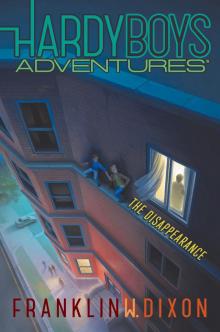 The Disappearance
The Disappearance Sea Life Secrets
Sea Life Secrets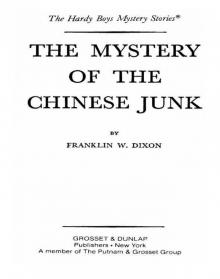 The Mystery of the Chinese Junk
The Mystery of the Chinese Junk A Skateboard Cat-astrophe
A Skateboard Cat-astrophe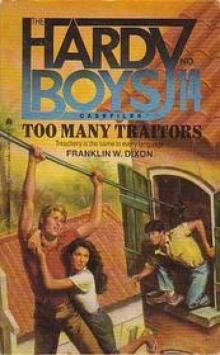 Too Many Traitors
Too Many Traitors Galaxy X
Galaxy X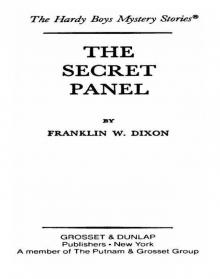 The Secret Panel
The Secret Panel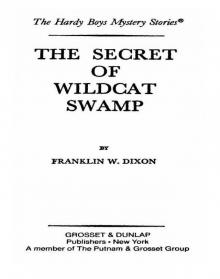 The Secret of Wildcat Swamp
The Secret of Wildcat Swamp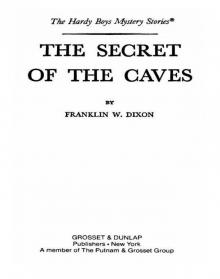 The Secret of the Caves
The Secret of the Caves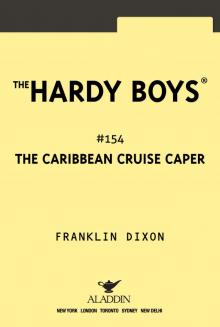 The Caribbean Cruise Caper
The Caribbean Cruise Caper Without a Trace
Without a Trace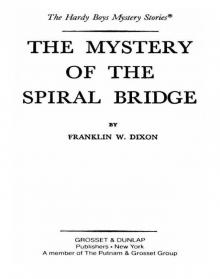 The Mystery of the Spiral Bridge
The Mystery of the Spiral Bridge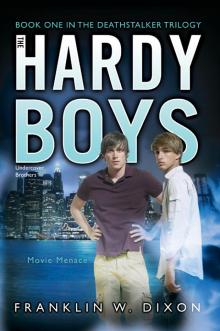 Movie Menace
Movie Menace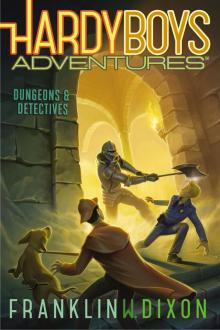 Dungeons & Detectives
Dungeons & Detectives Water-Ski Wipeout
Water-Ski Wipeout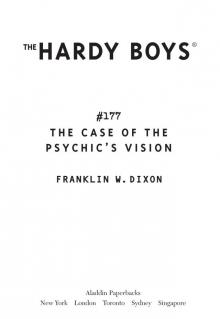 The Case of the Psychic's Vision
The Case of the Psychic's Vision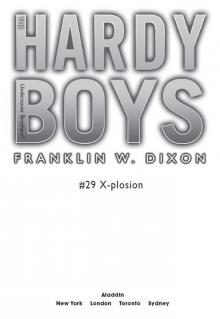 X-plosion
X-plosion Deathgame
Deathgame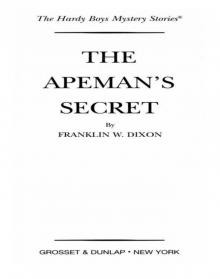 The Apeman's Secret
The Apeman's Secret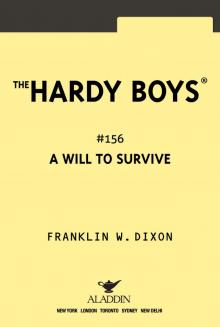 A Will to Survive
A Will to Survive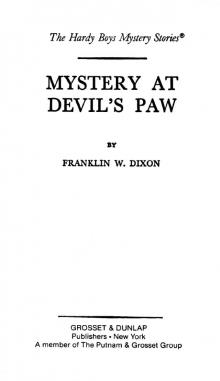 Mystery at Devil's Paw
Mystery at Devil's Paw Blood Money
Blood Money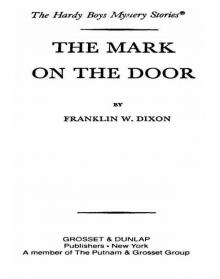 The Mark on the Door
The Mark on the Door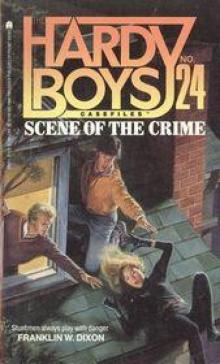 Scene of the Crime
Scene of the Crime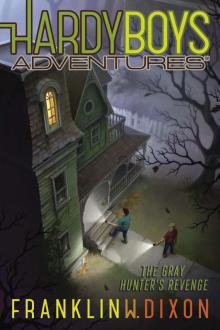 The Gray Hunter's Revenge
The Gray Hunter's Revenge Stolen Identity
Stolen Identity The Mummy's Curse
The Mummy's Curse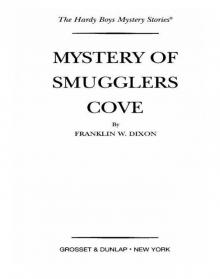 Mystery of Smugglers Cove
Mystery of Smugglers Cove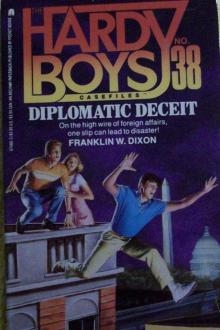 Diplomatic Deceit
Diplomatic Deceit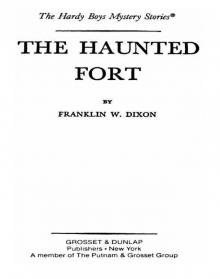 The Haunted Fort
The Haunted Fort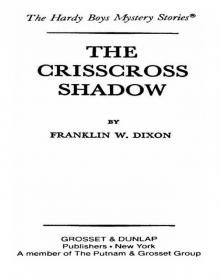 The Crisscross Shadow
The Crisscross Shadow Secret of the Red Arrow
Secret of the Red Arrow Trial and Terror
Trial and Terror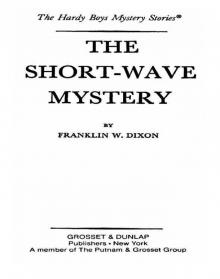 The Short-Wave Mystery
The Short-Wave Mystery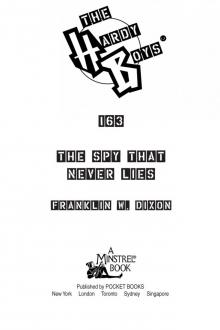 The Spy That Never Lies
The Spy That Never Lies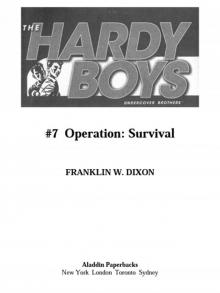 Operation: Survival
Operation: Survival Deception on the Set
Deception on the Set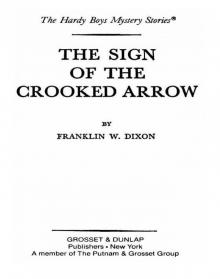 The Sign of the Crooked Arrow
The Sign of the Crooked Arrow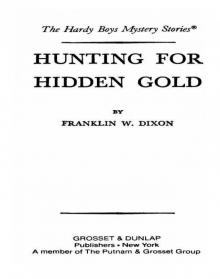 Hunting for Hidden Gold
Hunting for Hidden Gold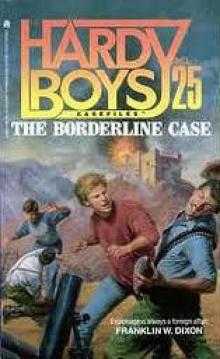 Disaster for Hire
Disaster for Hire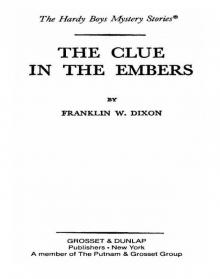 The Clue in the Embers
The Clue in the Embers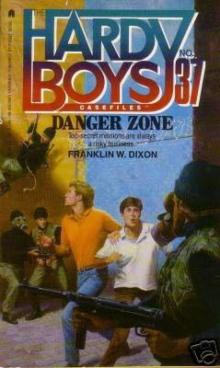 Danger Zone
Danger Zone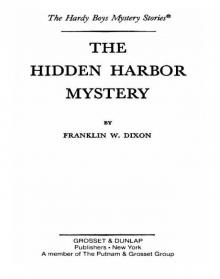 The Hidden Harbor Mystery
The Hidden Harbor Mystery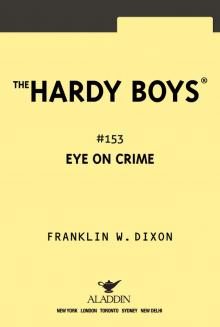 Eye on Crime
Eye on Crime A Game Called Chaos
A Game Called Chaos The Bicycle Thief
The Bicycle Thief The Missing Playbook
The Missing Playbook Survival Run
Survival Run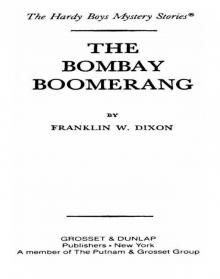 The Bombay Boomerang
The Bombay Boomerang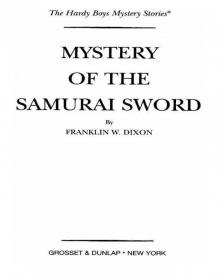 Mystery of the Samurai Sword
Mystery of the Samurai Sword Burned
Burned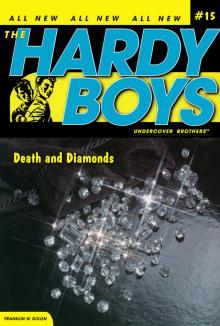 Death and Diamonds
Death and Diamonds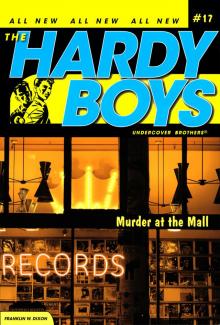 Murder at the Mall
Murder at the Mall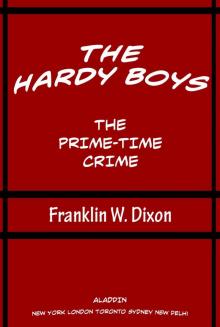 The Prime-Time Crime
The Prime-Time Crime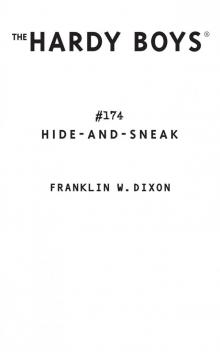 Hide-and-Sneak
Hide-and-Sneak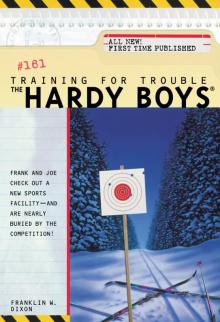 Training for Trouble
Training for Trouble Trouble in Paradise
Trouble in Paradise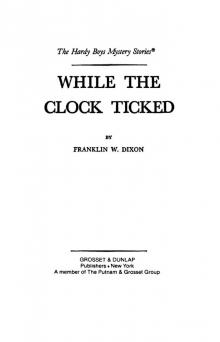 While the Clock Ticked
While the Clock Ticked The Alaskan Adventure
The Alaskan Adventure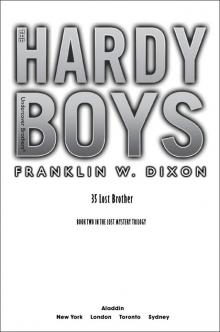 The Lost Brother
The Lost Brother Tunnel of Secrets
Tunnel of Secrets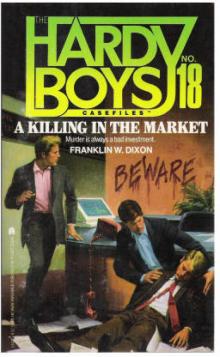 A Killing in the Market
A Killing in the Market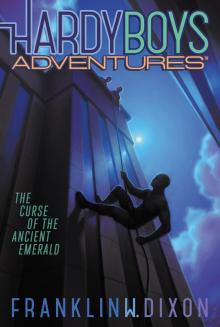 The Curse of the Ancient Emerald
The Curse of the Ancient Emerald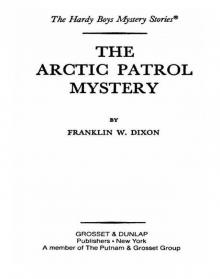 The Arctic Patrol Mystery
The Arctic Patrol Mystery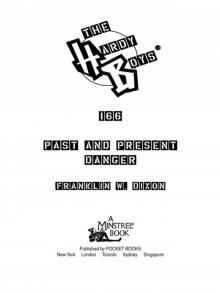 Past and Present Danger
Past and Present Danger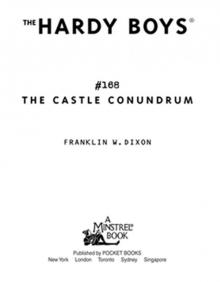 The Castle Conundrum (Hardy Boys)
The Castle Conundrum (Hardy Boys)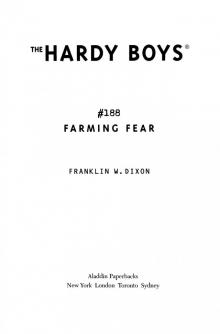 Farming Fear
Farming Fear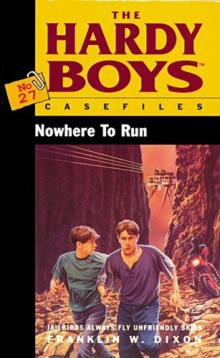 Nowhere to Run
Nowhere to Run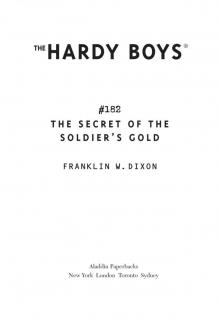 The Secret of the Soldier's Gold
The Secret of the Soldier's Gold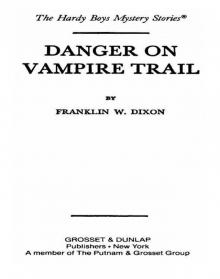 Danger on Vampire Trail
Danger on Vampire Trail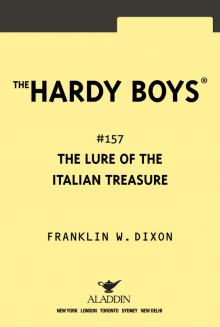 The Lure of the Italian Treasure
The Lure of the Italian Treasure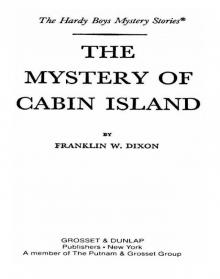 The Mystery of Cabin Island
The Mystery of Cabin Island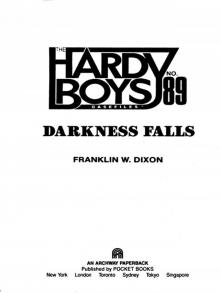 Darkness Falls
Darkness Falls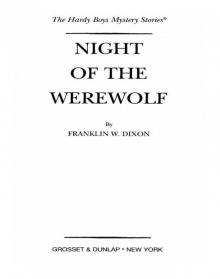 Night of the Werewolf
Night of the Werewolf Danger in the Extreme
Danger in the Extreme The Lazarus Plot
The Lazarus Plot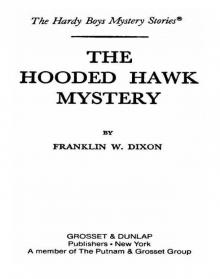 The Hooded Hawk Mystery
The Hooded Hawk Mystery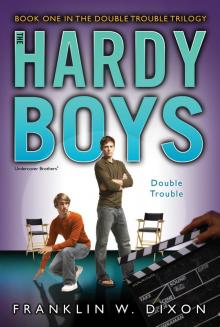 Double Trouble
Double Trouble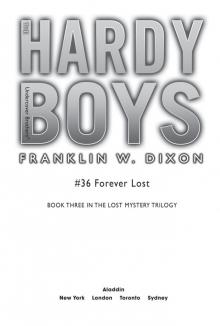 Forever Lost
Forever Lost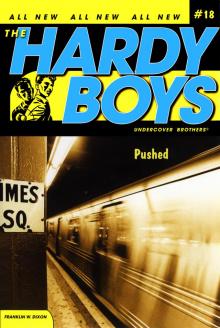 Pushed
Pushed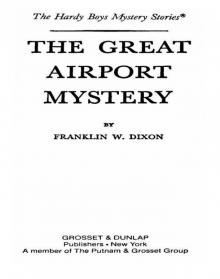 The Great Airport Mystery
The Great Airport Mystery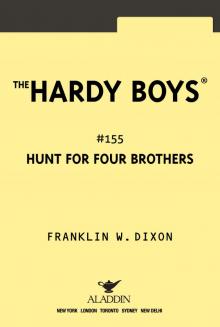 The Hunt for Four Brothers
The Hunt for Four Brothers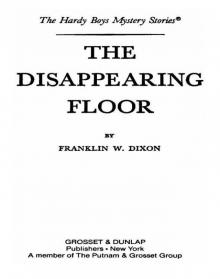 The Disappearing Floor
The Disappearing Floor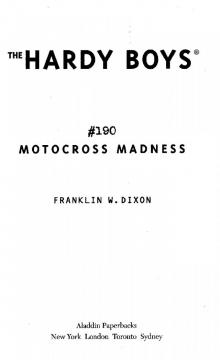 Motocross Madness
Motocross Madness Foul Play
Foul Play High-Speed Showdown
High-Speed Showdown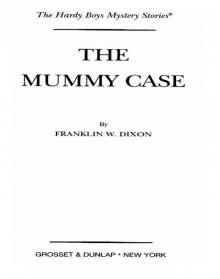 The Mummy Case
The Mummy Case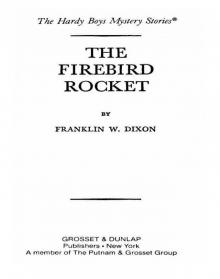 The Firebird Rocket
The Firebird Rocket Trouble in Warp Space
Trouble in Warp Space Ship of Secrets
Ship of Secrets Line of Fire
Line of Fire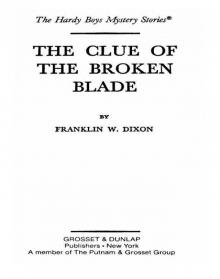 The Clue of the Broken Blade
The Clue of the Broken Blade Medieval Upheaval
Medieval Upheaval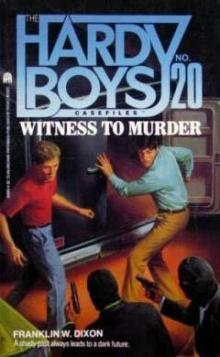 Witness to Murder
Witness to Murder The Giant Rat of Sumatra
The Giant Rat of Sumatra Attack of the Bayport Beast
Attack of the Bayport Beast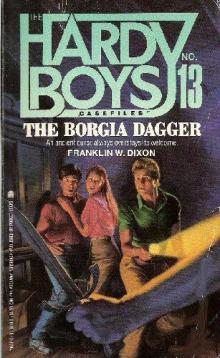 The Borgia Dagger
The Borgia Dagger Scavenger Hunt Heist
Scavenger Hunt Heist No Way Out
No Way Out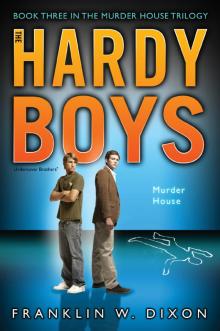 Murder House
Murder House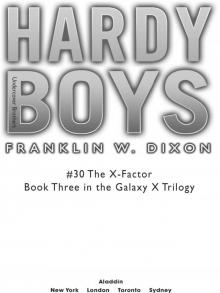 The X-Factor
The X-Factor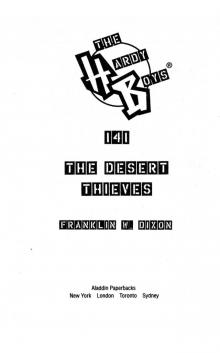 The Desert Thieves
The Desert Thieves Mystery of the Phantom Heist
Mystery of the Phantom Heist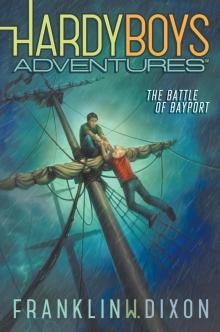 The Battle of Bayport
The Battle of Bayport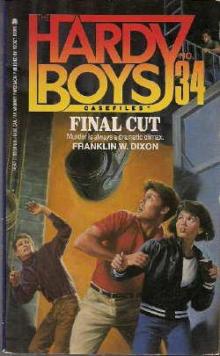 Final Cut
Final Cut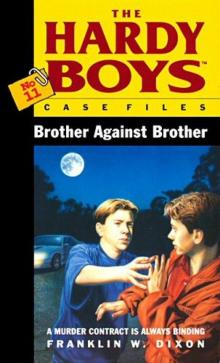 Brother Against Brother
Brother Against Brother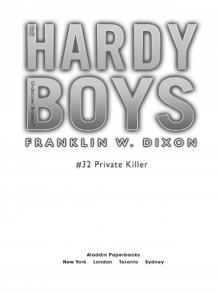 Private Killer
Private Killer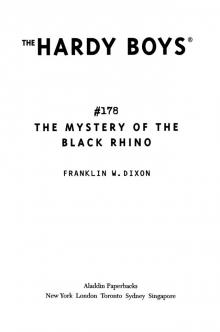 The Mystery of the Black Rhino
The Mystery of the Black Rhino Feeding Frenzy
Feeding Frenzy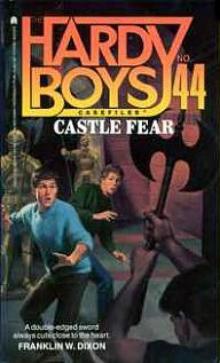 Castle Fear
Castle Fear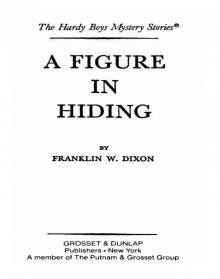 A Figure in Hiding
A Figure in Hiding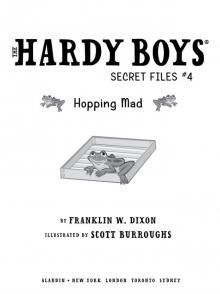 Hopping Mad
Hopping Mad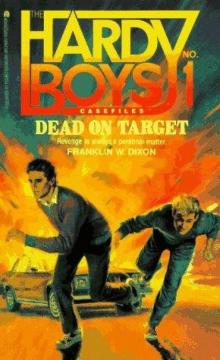 Dead on Target
Dead on Target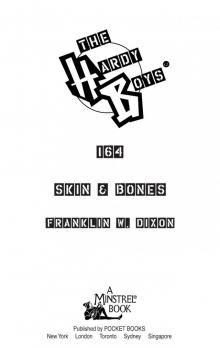 Skin and Bones
Skin and Bones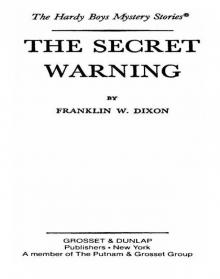 The Secret Warning
The Secret Warning Flesh and Blood
Flesh and Blood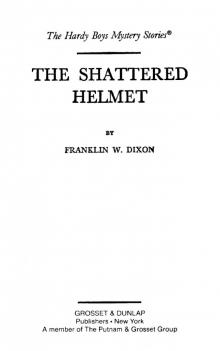 The Shattered Helmet
The Shattered Helmet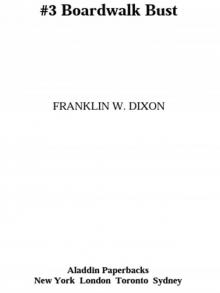 Boardwalk Bust
Boardwalk Bust Terror at High Tide
Terror at High Tide In Plane Sight
In Plane Sight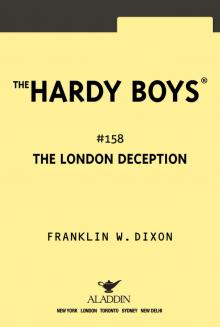 The London Deception
The London Deception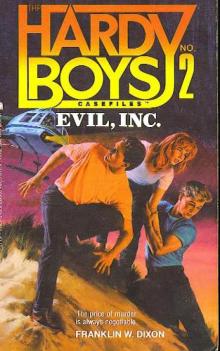 Evil, Inc.
Evil, Inc.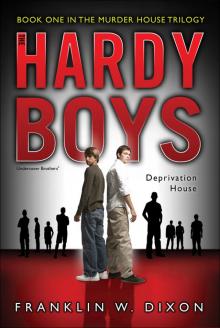 Deprivation House
Deprivation House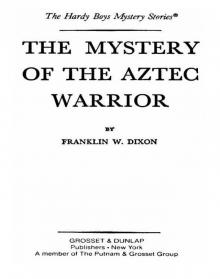 The Mystery of the Aztec Warrior
The Mystery of the Aztec Warrior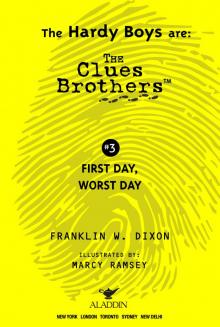 First Day, Worst Day
First Day, Worst Day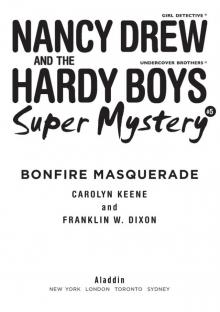 Bonfire Masquerade
Bonfire Masquerade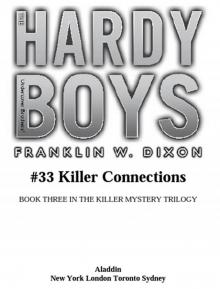 Killer Connections
Killer Connections Strategic Moves
Strategic Moves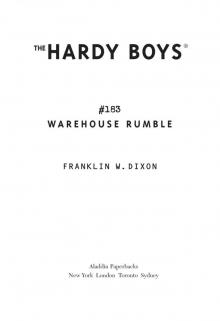 Warehouse Rumble
Warehouse Rumble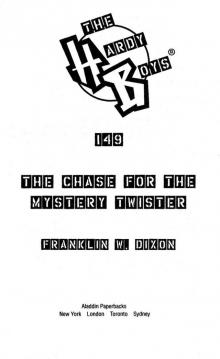 The Chase for the Mystery Twister
The Chase for the Mystery Twister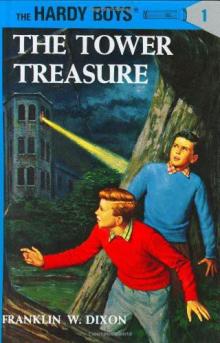 The Tower Treasure thb-1
The Tower Treasure thb-1 The Children of the Lost
The Children of the Lost The Last Laugh
The Last Laugh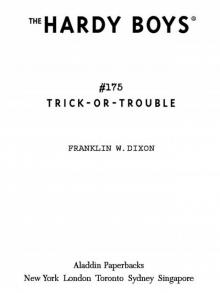 Trick-or-Trouble
Trick-or-Trouble Perfect Getaway
Perfect Getaway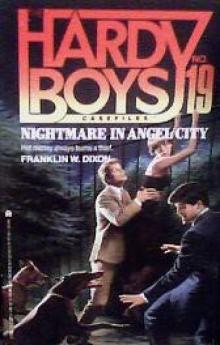 Nightmare in Angel City
Nightmare in Angel City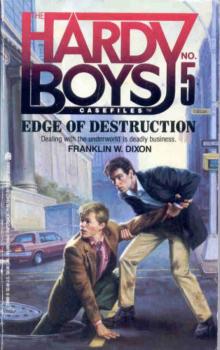 Edge of Destruction
Edge of Destruction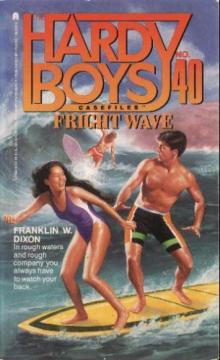 Fright Wave
Fright Wave The Jungle Pyramid
The Jungle Pyramid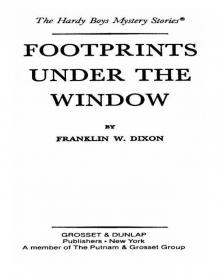 Footprints Under the Window
Footprints Under the Window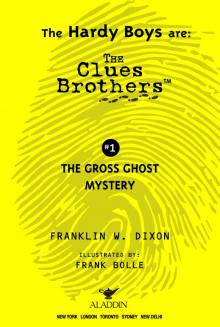 The Gross Ghost Mystery
The Gross Ghost Mystery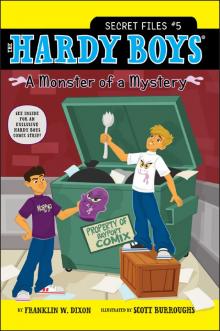 A Monster of a Mystery
A Monster of a Mystery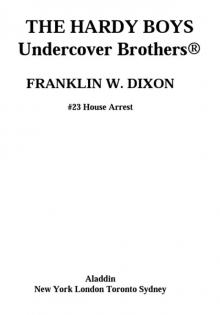 House Arrest
House Arrest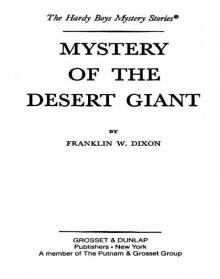 Mystery of the Desert Giant
Mystery of the Desert Giant Talent Show Tricks
Talent Show Tricks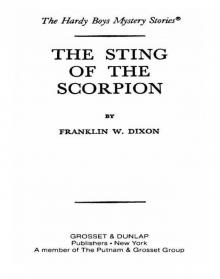 The Sting of the Scorpion
The Sting of the Scorpion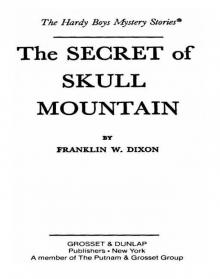 The Secret of Skull Mountain
The Secret of Skull Mountain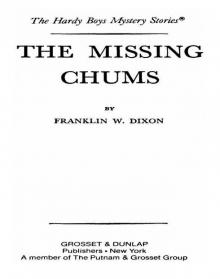 The Missing Chums
The Missing Chums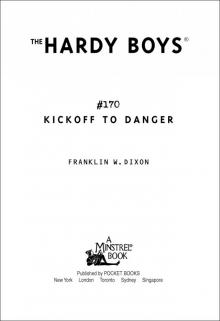 Kickoff to Danger
Kickoff to Danger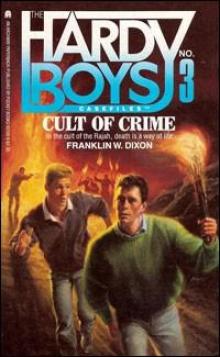 Cult of Crime
Cult of Crime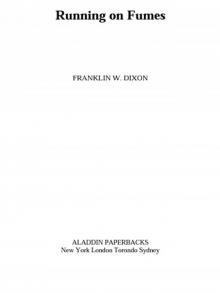 Running on Fumes
Running on Fumes Martial Law
Martial Law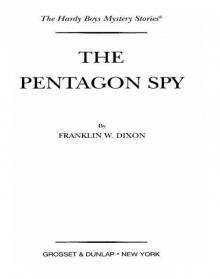 The Pentagon Spy
The Pentagon Spy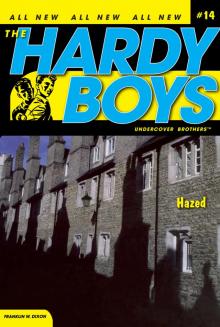 Hazed
Hazed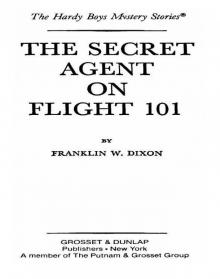 The Secret Agent on Flight 101
The Secret Agent on Flight 101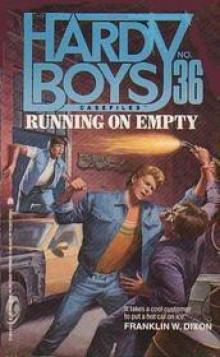 Running on Empty
Running on Empty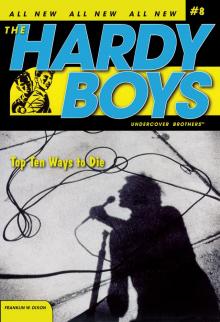 Top Ten Ways to Die
Top Ten Ways to Die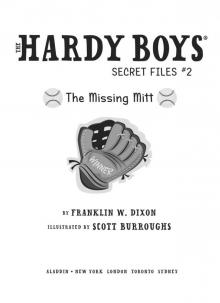 The Missing Mitt
The Missing Mitt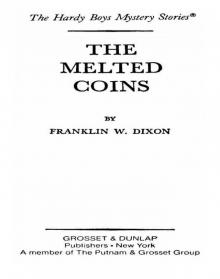 The Melted Coins
The Melted Coins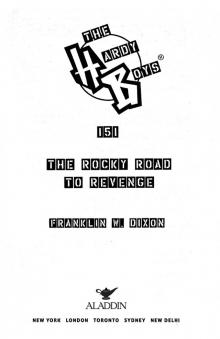 The Rocky Road to Revenge
The Rocky Road to Revenge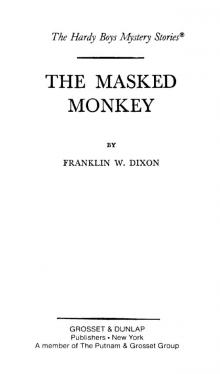 The Masked Monkey
The Masked Monkey Lost in Gator Swamp
Lost in Gator Swamp Extreme Danger
Extreme Danger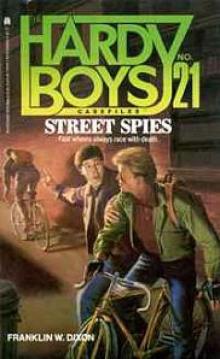 Street Spies
Street Spies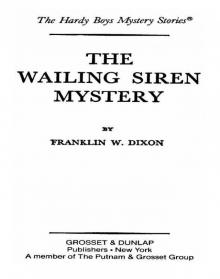 The Wailing Siren Mystery
The Wailing Siren Mystery The Dangerous Transmission
The Dangerous Transmission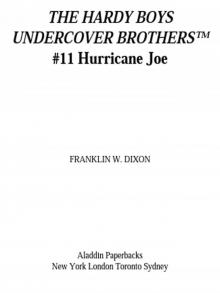 Hurricane Joe
Hurricane Joe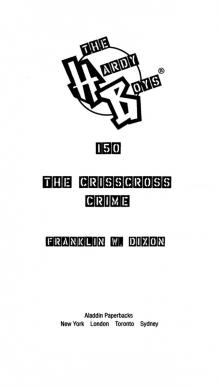 The Crisscross Crime
The Crisscross Crime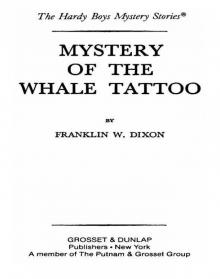 Mystery of the Whale Tattoo
Mystery of the Whale Tattoo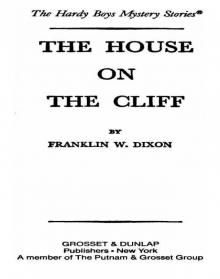 The House on the Cliff
The House on the Cliff Camping Chaos
Camping Chaos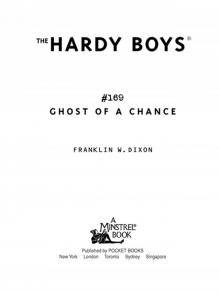 Ghost of a Chance
Ghost of a Chance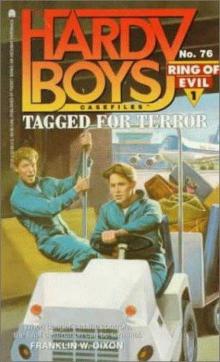 Tagged for Terror
Tagged for Terror Thrill Ride
Thrill Ride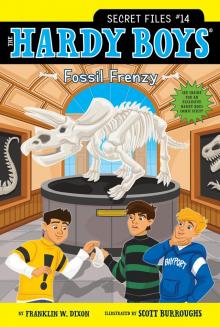 Fossil Frenzy
Fossil Frenzy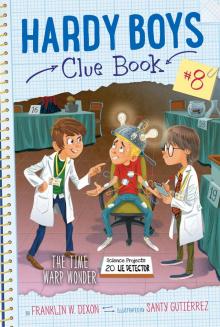 The Time Warp Wonder
The Time Warp Wonder Ghost Stories
Ghost Stories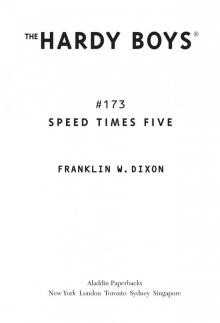 Speed Times Five
Speed Times Five What Happened at Midnight
What Happened at Midnight Three-Ring Terror
Three-Ring Terror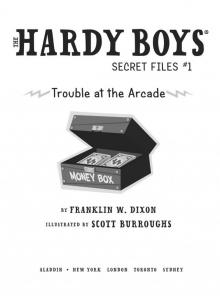 Trouble at the Arcade
Trouble at the Arcade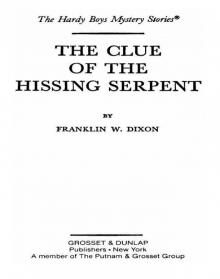 The Clue of the Hissing Serpent
The Clue of the Hissing Serpent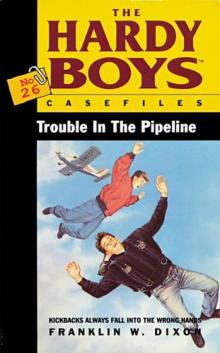 Trouble in the Pipeline
Trouble in the Pipeline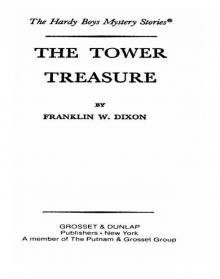 The Tower Treasure
The Tower Treasure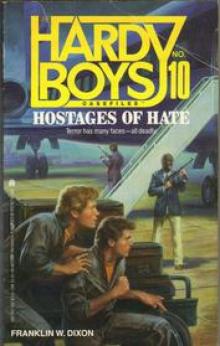 Hostages of Hate
Hostages of Hate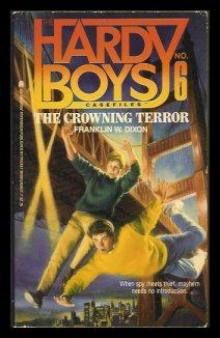 The Crowning Terror
The Crowning Terror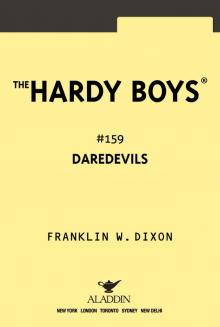 Daredevils
Daredevils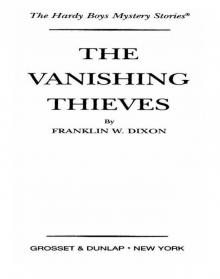 The Vanishing Thieves
The Vanishing Thieves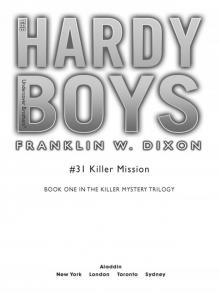 Killer Mission
Killer Mission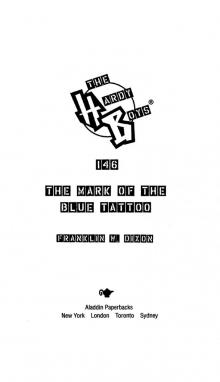 The Mark of the Blue Tattoo
The Mark of the Blue Tattoo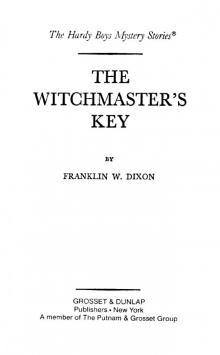 The Witchmaster's Key
The Witchmaster's Key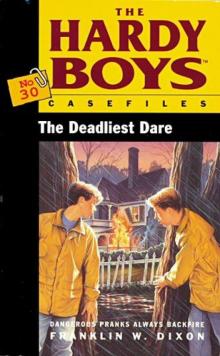 The Deadliest Dare
The Deadliest Dare Peril at Granite Peak
Peril at Granite Peak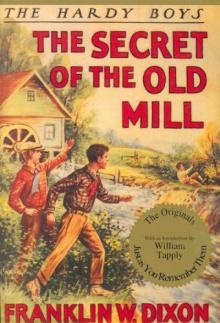 The Secret Of The Old Mill thb-3
The Secret Of The Old Mill thb-3 Rocky Road
Rocky Road The Demolition Mission
The Demolition Mission Blown Away
Blown Away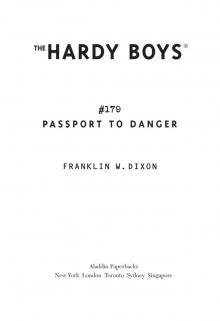 Passport to Danger
Passport to Danger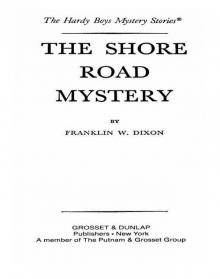 The Shore Road Mystery
The Shore Road Mystery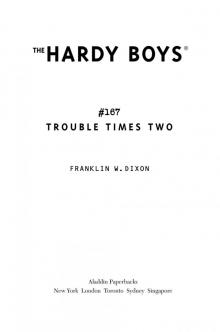 Trouble Times Two
Trouble Times Two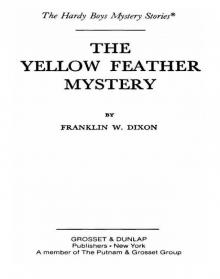 The Yellow Feather Mystery
The Yellow Feather Mystery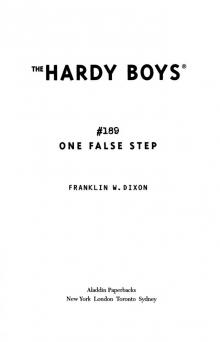 One False Step
One False Step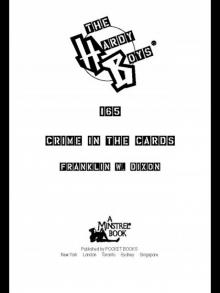 Crime in the Cards
Crime in the Cards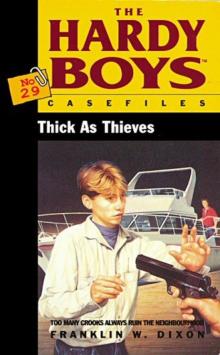 Thick as Thieves
Thick as Thieves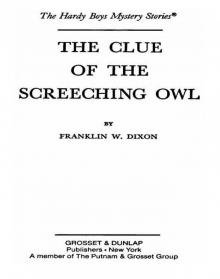 The Clue of the Screeching Owl
The Clue of the Screeching Owl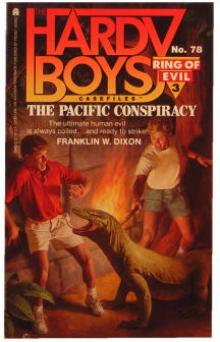 The Pacific Conspiracy
The Pacific Conspiracy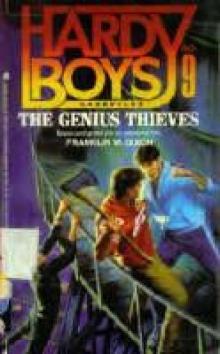 The Genius Thieves
The Genius Thieves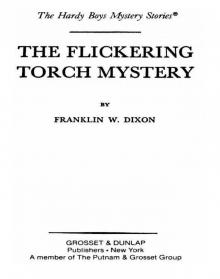 The Flickering Torch Mystery
The Flickering Torch Mystery Into Thin Air
Into Thin Air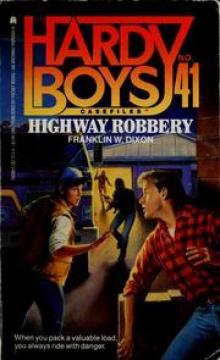 Highway Robbery
Highway Robbery Deadfall
Deadfall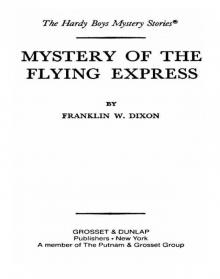 Mystery of the Flying Express
Mystery of the Flying Express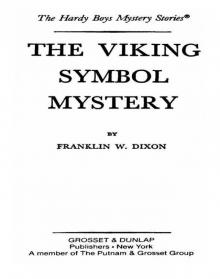 The Viking Symbol Mystery
The Viking Symbol Mystery The End of the Trail
The End of the Trail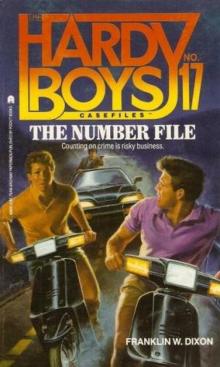 The Number File
The Number File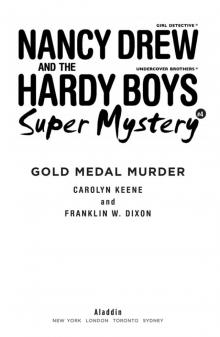 Gold Medal Murder
Gold Medal Murder Bound for Danger
Bound for Danger Collision Course
Collision Course The Madman of Black Bear Mountain
The Madman of Black Bear Mountain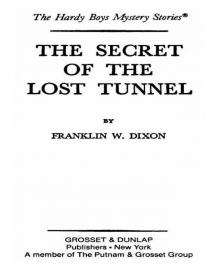 The Secret of the Lost Tunnel
The Secret of the Lost Tunnel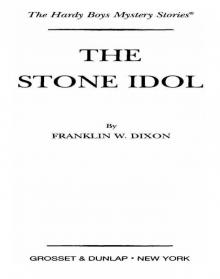 The Stone Idol
The Stone Idol The Secret of Pirates' Hill
The Secret of Pirates' Hill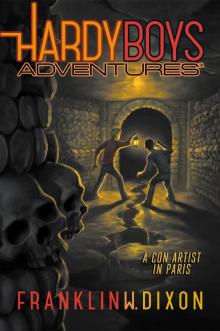 A Con Artist in Paris
A Con Artist in Paris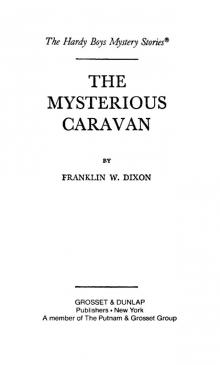 The Mysterious Caravan
The Mysterious Caravan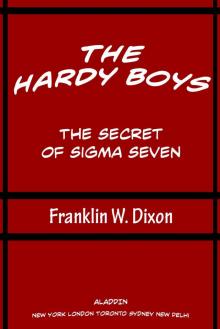 The Secret of Sigma Seven
The Secret of Sigma Seven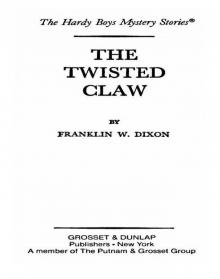 The Twisted Claw
The Twisted Claw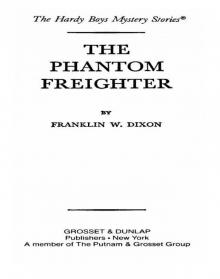 The Phantom Freighter
The Phantom Freighter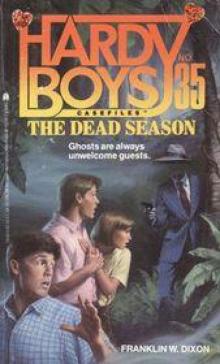 The Dead Season
The Dead Season The Video Game Bandit
The Video Game Bandit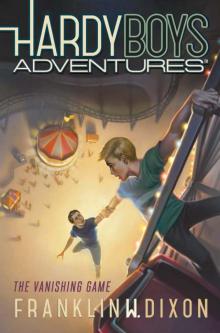 The Vanishing Game
The Vanishing Game Typhoon Island
Typhoon Island